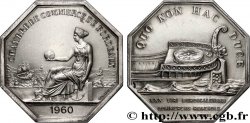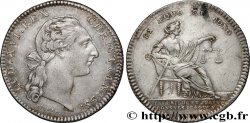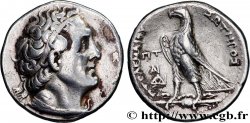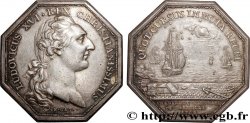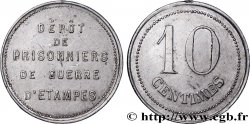Live auction - fjt_1042479 - CHAMBERS OF COMMERCE / CHAMBRES DE COMMERCE Chambre de commerce de Marseille (Louis XVI) 1775
You must signin and be an approved bidder to bid, LOGIN TO BID. Accounts are subject to approval and the approval process takes place within 48 hours. Do not wait until the day a sale closes to register. Clicking on "BID" constitutes acceptance of the terms of use of cgb.fr private live auctions.
Bids must be placed in whole Euro amounts only. The sale will start closing at the time stated on the item description; any bids received at the site after the closing time will not be executed. Transmission times may vary and bids could be rejected if you wait until the last second. For further information check the Live auction FAQ
All winning bids are subject to a 18% buyer’s fee.
All winning bids are subject to a 18% buyer’s fee.
| Estimate : | 200 € |
| Price : | 100 € |
| Maximum bid : | 100 € |
| End of the sale : | 22 July 2025 19:07:14 |
| bidders : | 1 bidder |
Type : Chambre de commerce de Marseille (Louis XVI)
Date: 1775
Metal : silver
Diameter : 33,5 mm
Orientation dies : 12 h.
Weight : 17,42 g.
Edge : lisse
Puncheon : sans poinçon
Rarity : R1
Coments on the condition:
Jolie patine grise hétérogène, légèrement irisée au revers. Petite usure à l’avers. Présence de quelques coups et rayures
Catalogue references :
Obverse
Obverse legend : LUDOVICUS XVI. REX CHRISTIANISS..
Obverse description : Buste de Louis XVI à droite, les cheveux noués derrière la nuque ; au-dessous signature N. GATTEAUX..
Obverse translation : (Louis XVI, roi très chrétien).
Reverse
Reverse legend : QUOT CURSUS IMMOTA REGIT.
Reverse description : Bateaux devant le quai du port de Marseille sur lequel sont posés des ballots dont l'un marqué CAFE et une ancre ; l'un des ballots porte la lettre N pour le graveur N. Gatteaux ; à l’exergue : CHAMBRE DU COMMERCE/ DE MARSEILLE/ 1775.
Reverse translation : (Elle guide tout en restant immobile).
Commentary
Semble rare avec cette effigie. La première chambre de commerce fut celle de Marseille créée à la fin du XVIe siècle. Pour Paris, les six corps des marchands et les juges-consuls avaient un rôle similaire à celui d'une chambre de commerce : une association de commerçants réunis pour délibérer sur les intérêts de leur ville ou de leur région et donner leur avis au gouvernement. Colbert les légalise en 1664 en instaurant que chaque place de commerce choisira deux d'entre eux pour les représenter. L'institution ne fut toutefois établie réellement que par l'arrêt du Conseil du 30 août 1701 et de nombreuses chambres de commerce apparaissent au XVIIIe siècle à Lyon, Rouen, Toulouse, Montpellier, Bordeaux, etc.. La plus importante d'entre elles est Marseille qui avait des attributions dans tout le commerce du Levant et était du département des Affaires étrangères, les autres relevaient du Contrôle général des Finances. Supprimées par la Constituante en 1791, les chambres de commerce sont rétablies sous le Consulat. Depuis 1832, leur recrutement se fait par élections, elles sont devenues chambres de commerce et d'industrie depuis 1898, regroupées en 21 chambres régionales.
Seems rare with this effigy. The first chamber of commerce was that of Marseille, created at the end of the 16th century.. For Paris, the six merchant corps and the consul judges had a role similar to that of a chamber of commerce: an association of merchants gathered to deliberate on the interests of their city or region and give their opinion to the government.. Colbert legalized them in 1664 by establishing that each trading place would choose two of them to represent them.. The institution was, however, only actually established by the Council's decree of 30 August 1701 and numerous chambers of commerce appeared in the 18th century in Lyon, Rouen, Toulouse, Montpellier, Bordeaux, etc.. . The most important of these was Marseille, which had responsibilities in all Levantine trade and was part of the Department of Foreign Affairs; the others came under the General Control of Finance.. Abolished by the Constituent Assembly in 1791, the chambers of commerce were reestablished under the Consulate. Since 1832, their recruitment has been done by elections, they have become chambers of commerce and industry since 1898, grouped into 21 regional chambers
Seems rare with this effigy. The first chamber of commerce was that of Marseille, created at the end of the 16th century.. For Paris, the six merchant corps and the consul judges had a role similar to that of a chamber of commerce: an association of merchants gathered to deliberate on the interests of their city or region and give their opinion to the government.. Colbert legalized them in 1664 by establishing that each trading place would choose two of them to represent them.. The institution was, however, only actually established by the Council's decree of 30 August 1701 and numerous chambers of commerce appeared in the 18th century in Lyon, Rouen, Toulouse, Montpellier, Bordeaux, etc.. . The most important of these was Marseille, which had responsibilities in all Levantine trade and was part of the Department of Foreign Affairs; the others came under the General Control of Finance.. Abolished by the Constituent Assembly in 1791, the chambers of commerce were reestablished under the Consulate. Since 1832, their recruitment has been done by elections, they have become chambers of commerce and industry since 1898, grouped into 21 regional chambers








 Report a mistake
Report a mistake Print the page
Print the page Share my selection
Share my selection Ask a question
Ask a question Consign / sell
Consign / sell
 Full data
Full data

